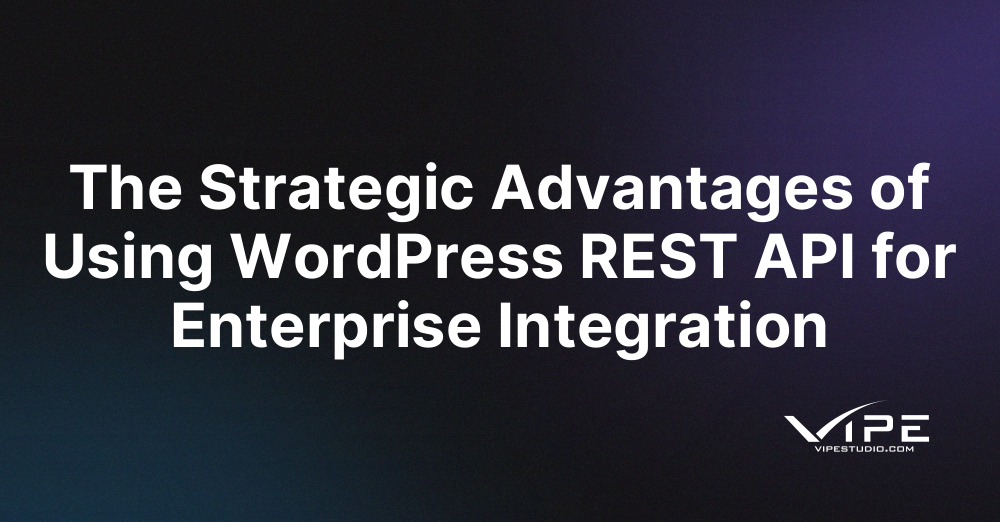12.06.2025
WordPress Development
The Strategic Advantages of Using WordPress REST API for Enterprise Integration
READING TIME: MIN
Table of Content
As enterprise businesses continue to expand their digital ecosystems, the need for flexible, scalable, and efficient integrations between different platforms becomes critical. WordPress, traditionally known as a content management system, has evolved into a robust application platform thanks to the introduction of its REST API. For enterprises looking to leverage WordPress beyond basic content publishing, the REST API opens doors to powerful integrations and customized solutions.
Understanding the WordPress REST API and Its Role in Modern Development
The WordPress REST API allows external applications to interact with WordPress data using standard HTTP requests. This means developers can read, create, update, and delete content programmatically, without the need to directly access WordPress’s core files or database. For enterprises, this unlocks opportunities for headless architectures, mobile applications, third-party integrations, and microservice-based infrastructures.
Unlike traditional WordPress themes that render content server-side, REST API enables full separation of the backend and frontend, making WordPress an efficient backend CMS that can power multiple digital touchpoints simultaneously.
How Enterprises Can Benefit from WordPress REST API Integrations
Enterprise businesses often operate with multiple systems such as CRM, ERP, inventory management, analytics, and customer support platforms. The REST API allows WordPress to seamlessly communicate with these systems, enabling:
- Centralized data management: Synchronize product catalogs, customer data, and orders across systems.
- Personalized user experiences: Deliver dynamic, personalized content based on user profiles from external data sources.
- Multi-channel publishing: Distribute content across web, mobile apps, kiosks, and IoT devices.
- Real-time updates: Automate workflows such as inventory changes or order tracking status updates across platforms.
By positioning WordPress as a content hub, enterprises achieve consistency and agility across their digital presence.
Enterprise Use Cases Where WordPress REST API Excels
The versatility of the REST API makes it highly effective for a variety of enterprise scenarios, including:
- Headless commerce platforms where WordPress manages product descriptions, blogs, and marketing content while the commerce logic lives elsewhere.
- Omnichannel content delivery across multiple websites, apps, and partner portals sharing synchronized content from a central WordPress instance.
- Custom CRM and ERP integrations to align marketing content with customer data for better targeting and segmentation.
- Secure client portals where content visibility and access levels are dynamically controlled based on external system permissions.
At Vipe Studio, we regularly architect enterprise-grade integrations using the WordPress REST API, ensuring that our clients’ platforms remain both future-proof and scalable.
Security Considerations for REST API in Enterprise Environments
Security is always a top priority for enterprises. While the WordPress REST API is robust, implementing enterprise-grade security practices is crucial:
- Use strong authentication methods such as OAuth 2.0 or JWT (JSON Web Tokens).
- Enforce role-based access control to restrict sensitive data exposure.
- Sanitize and validate all incoming requests to prevent injection attacks.
- Implement API rate limiting and monitoring to avoid abuse.
With proper safeguards in place, enterprises can confidently open their WordPress instance to external systems while minimizing risk.
WordPress REST API as a Foundation for Future Growth
As digital ecosystems grow more complex, enterprises require platforms that can adapt to rapid changes. The WordPress REST API positions WordPress not only as a CMS but as an integration-ready, highly extensible data platform that can scale alongside business needs.
Whether you’re looking to connect your marketing website to your internal CRM, deliver content across multiple devices, or build fully decoupled web applications, the REST API makes it possible — and sustainable for the long term.
To learn how your business can harness the full power of the WordPress REST API, consult with our team at Vipe Studio or submit a request through our inquiry form.
More on The Topic
- Navigating WooCommerce Performance: Real-World Strategies
- The Role of AI in WordPress Development Workflows
- Optimizing WordPress for Enterprise: Beyond Basic Caching
- WordPress and Headless Commerce: A Provocative Dilemma
- Decoupled WordPress Architecture: The Future or a Fad?
The content of this website is copyrighted and protected by Creative Commons 4.0.



